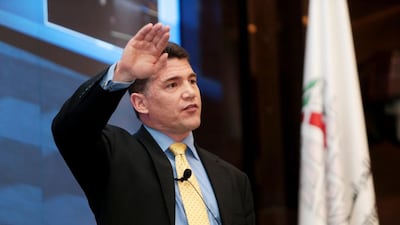ABU DHABI // Robot soldiers, laser guns and ultrasonic weapons that use sound to stun at a distance.
This is the battlefield of the future and it is only years away, according to a top UK defence expert.
But increasing connectivity brings more risks and military technology will become more accessible to terrorists by 2045, warned Simon Cole of the UK’s ministry of defence.
“We will see more unmanned systems as they are becoming more capable,” said Dr Cole, the assistant head at the ministry’s development, concepts and doctrine centre.
“They won’t just be confined to the air environment and some experts reckon that, in the next ten years, robots are likely to replace infantry soldiers. That may seem slightly far-fetched, but one thing technology does is rise quickly.”
Human beings, however, will still play a role.
“It will be people who decide to go to war,” he said at an Emirates Centre for Strategic Studies and Research talk in the capital on Tuesday. “But for richer, technologically-advanced countries, it will probably be less likely for them to use people to fight in war. Humans will slowly be removed from the battlefield.”
Turning to the rise of data and the internet, Dr Cole said concealing military information would become tougher.
“Military technology is likely to spread through the internet and non-state actors are likely to have access to advanced weaponry in a way that hasn’t been done [before].
“So, for submarines trying to hide in the depths, you can imagine a world where the oceans are full of sensors detecting salinity and environmental conditions – so it will be a much more difficult world to hide in,” he said.
But as the world becomes more connected, it is thought state agencies would also be able to find more terrorists. “It will be a sort of cat-and-mouse game,” Dr Cole said.
“Western nations will see a loss of their military technological edge, such as the US. China and other parts of Asia will start having more of an edge.”
Novel and advanced weapons are also expected to be deployed in future wars.
“Already lasers have proven to be able to intercept artillery shells and unmanned systems.
“We will see the development of sound weapons that can engage much more precisely, as well as non-lethal techniques where you can use lasers to stun an opponent at a considerable distance.”
The ability to target individuals is a growing trend that will continue to 2045.
“It will be increasingly easier to find individuals, not only through DNA, but through digital signatures,” Dr Cole said. “Technology will change our relationships as robots get more effective.”
But conflict will endure and the risk of a global outbreak in the next 30 years cannot be ruled out, he cautioned, “especially when you have emerging great powers like India and China”.
“But deaths due to violence are decreasing and we expect that to continue. However, we, as thinkers and leaders, have the opportunity to influence that future and those countries and organisations that are resilient, adaptable and flexible to change are likely to thrive.”
Ahmed Al Astad, the research centre’s deputy director general for community service, said the international environment was constantly evolving.
“This comes within a complicated and interrelated context that requires a close follow-up of changes,” he said. “We have to build scenarios to forecast the future dimensions of defence and politics and how to deal with them.”
Dr Cole’s talk, “Global Strategic trends: Challenges and Opportunities out to 2045” is part a continuing series of events on defence, security and doctrine at the centre in Abu Dhabi.
cmalek@thenational.ae

